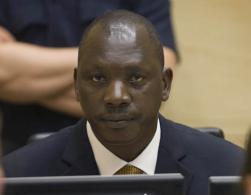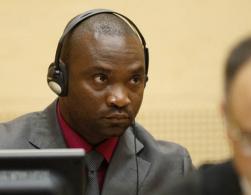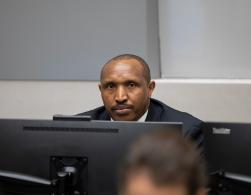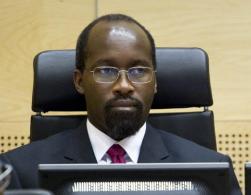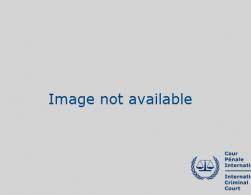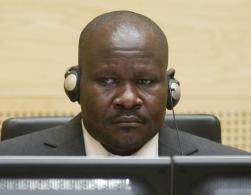Democratic Republic of the Congo
Situation in the Democratic Republic of the Congo
ICC-01/04

Situation referred to the ICC by the DRC Government: April 2004
ICC investigations opened: June 2004
Current focus:Alleged war crimes and crimes against humanity committed in the context of armed conflict in the DRC since 1 July 2002 (when the Rome Statute entered into force)
Current regional focus: Eastern DRC, in the Ituri region and the North and South Kivu Provinces
Pre-Trial Chamber I
Judge Iulia Motoc (Presiding Judge)Judge Reine Alapini-Gansou
Judge Socorro Flores Liera
DOCUMENTS
Jurisdiction in the general situation
In April 2002, the DRC ratified the Rome Statute, and in April 2004, referred the situation in its territory since 1 July 2002 to the ICC. The ICC therefore may exercise its jurisdiction over crimes listed in the Rome Statute committed on the territory of the DRC or by its nationals from 1 July 2002 onwards.
Context and alleged crimes
The ICC investigations in the DRC have focused on alleged war crimes and crimes against humanity committed mainly in eastern DRC, in the Ituri region and the North and South Kivu Provinces, since 1 July 2002.
In opening the investigation in June 2004, the ICC's Office of the Prosecutor issued a press release acknowledging that alleged crimes were reported since the 1990's, but that the Court's jurisdiction started on 1 July 2002, and stating: "States, international organizations and non-governmental organizations have reported thousands of deaths by mass murder and summary execution in the DRC since 2002. The reports allege a pattern of rape, torture, forced displacement and the illegal use of child soldiers."
The investigation led to a number of cases, which have involved charges that include the following crimes:
-
war crimes: enlisting and conscripting child soldiers under the age of fifteen years and using them to participate actively in hostilities; murder and attempted murder; wilful killing; attacking civilians; rape; sexual slavery of civilians; pillaging; displacing civilians; attacking protected objects; destroying property; rape; sexual slavery; mutilation; cruel treatment; torture; destruction of property; pillaging and outrages against personal dignity; and
-
crimes against humanity: murder and attempted murder; torture; rape; sexual slavery; inhuman acts; persecution; forcible transfer of population, attacking a civilian population; destroying property; and pillaging.
This was the Office of the Prosecutor's first investigation, and led to its three convictions, in the case The Prosecutor v. Thomas Lubanga Dyilo, The Prosecutor v. Germain Katanga, and et The Prosecutor v. Bosco Ntaganda and to the acquittal of Mr Ngudojolo Chui.
6
Cases
7
Warrants of arrest
1
In custody
1
At large
Cases
Found guilty, on 14 March 2012, of the war crimes of enlisting and conscripting children under the age of 15 years and using them to participate actively in hostilities (child soldiers). Sentenced, on 10 July 2012, to a total of 14 years of imprisonment. Verdict and sentence confirmed by Appeals Chamber on 1 December 2014. On 19 December 2015, Mr Lubanga was transferred to a prison facility in the DRC to serve his sentence of imprisonment. On 15 March 2020, Thomas Lubanga was released after having served 14 years of imprisonment. The reparations proceedings for victims started on 7 August 2012.
Found guilty, on 7 March 2014, as an accessory to one count of a crime against humanity (murder) and four counts of war crimes (murder, attacking a civilian population, destruction of property and pillaging) committed on 24 February 2003 during the attack on the village of Bogoro, in the Ituri district of the DRC. The judgment is final, as both the Defence and Prosecution withdrew their appeals on 25 June 2014. Sentenced to a total of 12 years' imprisonment; time spent in detention at the ICC – between 18 September 2007 and 23 May 2014 – was deducted from the sentence.
Order on victim reparations : 24 March 2017
On 8 July 2019, ICC Trial Chamber VI found Bosco Ntaganda guilty, beyond reasonable doubt, of 18 counts of war crimes and crimes against humanity, committed in Ituri, DRC, in 2002-2003. On 7 November 2019, Bosco Ntaganda was sentenced to a total of 30 years of imprisonment. The time he spent in ICC detention - from 22 March 2013 to 7 November 2019 - will be deducted from this sentence.
On 30 March 2021, the ICC Appeals Chamber confirmed the conviction and the sentence in this case. These two decisions are now final.
Next steps: On 8 March 2021, Trial Chamber VI delivered its Order on Reparations to victims against Mr Ntaganda.The Defence of Mr Ntaganda and the Legal Representative of one of the two groups of victims appealed the order. On 12 September 2022, the Appeals Chamber issued its judgment in the appeals and remanded several issues for the Trial Chamber to issue a new reparations order. On 14 July 2023, Trial Chamber II delivered an Addendum to the Reparations Order of 8 March 2021. Following this Addendum, the Chamber will rule on all aspects of the Draft Implementation Plan that do not require further submissions from the ICC Trust Fund for Victims or the parties.
On 14 December 2022, Mr Ntaganda was transferred to the Kingdom of Belgium to serve his sentence of imprisonment at the Leuze-en-Hainaut prison.
Charges not confirmed
Pre-Trial Chamber I declined to confirm the charges against Callixte Mbarushimana and did not commit the case to trial. The Prosecution's appeal was dismissed. On 23 December 2011, Mr Mbarushimana was released from the ICC custody.
Next steps: The case is considered closed unless and until the Prosecutor submits new evidence.
A warrant of arrest was issued for Sylvestre Mudacumura on 13 July 2012. The suspect is still at large.
Next steps: Until Mr Mudacumura is arrested and transferred to the seat of the Court in The Hague, the case will remain in the Pre-Trial stage. The ICC does not try individuals unless they are present in the courtroom.
Acquitted
On 18 December 2012, Trial Chamber II acquitted Mathieu Ngudjolo Chui of the charges of war crimes and crimes against humanity and ordered his immediate release. The Prosecution appealed the verdict on 20 December 2012. On 27 February 2015, the verdict was upheld by the Appeals Chamber.
